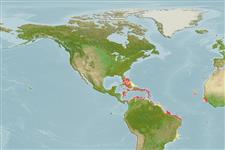分類 / Names
俗名 | 同種異名 | Catalog of Fishes(屬, 種) | ITIS | CoL | WoRMS | Cloffa
Teleostei >
Anguilliformes (Eels and morays)
鰻鱺目 (Eels and morays) >
Muraenidae (Moray eels)
鯙科 (Moray eels) > Muraeninae
Etymology: Echidna: Greek, echidna = viper, 1847 (Ref. 45335).
Eponymy: In Greek mythology Echidna was a female monster, and mother of many other monsters including the Hydra. Hesiod described her as “half a nymph with glancing eyes and fair cheeks, and half again a huge snake, great and awful, with speckled skin.” (Ref. 128868), visit book page.
More on author: Bloch.
Environment: milieu / climate zone / depth range / distribution range
生態學
海洋 礁區魚類; 深度上下限 0 - 12 m (Ref. 9710), usually 0 - 2 m (Ref. 40849). 熱帶; 33°N - 30°S, 82°W - 14°W
Western Atlantic: Bermuda, Florida (USA), and the Bahamas to the Antilles (Ref. 26340) and Brazil. Eastern Atlantic: Cape Verde (Ref. 34514) and Ascension Island (Ref. 4450). The only record from West Africa is probably erroneous (Ref. 4450). Also southern Atlantic islands (Ref. 26938).
西大西洋: 百慕達群島,佛羅里達 (美國), 與巴哈馬到安地列斯群島 (參考文獻 26340) 與巴西。 東大西洋: 維德角 (參考文獻 34514) 與阿森松島.(參考文獻 4450) 可能是的來自非洲西方部的唯一的記錄錯誤的.(參考文獻 4450) 也大西洋南方的島嶼.(參考文獻 26938)
大小 / 重量 / 年齡
Maturity: Lm ? range ? - ? cm
Max length : 165 cm TL 雄魚/尚未辨別雌雄; (Ref. 26340); common length : 40.0 cm TL 雄魚/尚未辨別雌雄; (Ref. 5217)
簡短描述
檢索表 | 型態特徵 | 形態測量圖
With short blunt snout, yellow chain-like markings, teeth bluntly pointed or molar-like especially on roof of mouth (Ref. 26938).
有短的鈍吻,黃色的像鏈一樣的斑紋,齒頓尖或臼齒狀的尤其在嘴的頂部上.(參考文獻 26938)
A benthic and solitary species (Ref. 26340) found commonly on reefs and rocky shore areas. Feeds on small fishes and crustaceans (Ref. 5521). At Fernando de Noronha Archipelago, off NE Brazil, forages for sally lightfoot crabs (Grapsus grapsus) on exposed reefs at ebb tide and in tide-pools mostly at daytime. Able to withstand up to 30 minutes out of water while foraging, uses four main tactics both in and out of the water. Searches for prey at pool rims and rock bases poking into crevices and holes, stealthily approaches previously sighted prey, chases prey and ambushes prey from under rocks and crevices. Hunting success varies with employed tactic, but overall success is about 50%. May move up to 6 meters in about 1 hour while foraging on the exposed reef. Its crab hunting is mostly visually guided and a fish darting nearby a stealthily foraging moray may cause it to miss the strike; the missed crab may be chased up to 5 m on the reef. Able to strike with its body partly or entirely out of the water, usually strikes from a distance of 5 to10 centimeters. Small crabs are swallowed whole, whereas larger ones are torn apart by a combination of tugging, rotating, knotting, and thrashing movements. Handling time is related to prey size, the largest crabs (carapace width 2.3-3.2 times larger than moray’s head width) broken up and swallowed within 90 to 240 seconds. Attracted to plastic or rubber decoys dragged on a nylon string nearby, striking at these (Ref. 50922).
一個底棲與獨居性的種 (參考文獻 26340) 通常在礁與岩岸區域上發現。 吃小魚與甲殼動物。 (參考文獻 5521) 在 Fernando de Noronha 列島, 外海的
東北巴西,在白天大部份在退潮的暴露礁石上與在潮池中為突擊 lightfoot 螃蟹 ( Grapsus grapsus) 覓食。 能抵抗向上到 30 細小的離開水面然而覓食, 使用四個主要的戰術中與離開水面。 在水池邊緣搜尋獵物與岩石基底進入裂隙與洞之內撥開, 先前暗地裡接近看得見的獵物, 獵逐獵物而且埋伏突襲獵物從在岩石與裂隙下面。 獵食成功隨著利用戰略改變,但是整體的成功是大約 50% 。 當捕食裸露的礁時候,在大約 1 小時中 6 公尺處可以向上移動到。 它的獵食的螃蟹視覺上大部份被引導,而且在附近衝出一暗地裡覓食海鰻的一個魚可能導致它錯過攻擊; 被錯過的螃蟹可能是在礁上獵逐向上到 5 公尺。 能,攻擊部分或完全地用它的身體出自
水, 通常攻擊從遠處 5 到 10個公分。 小的螃蟹被整個吞下,然而較大的一些分別地被用力拉,旋轉,打結的組合 , 與猛移運動撕開。 操作的時間被與獵物的大小有關, 在 90 到 240 秒裡面瓦解而且吞的最大的螃蟹 (甲殼寬度 2.3-3.2 倍大於海鰻的頭部寬度)。 被塑膠吸引了或者包以橡皮被打擊這些的在附近被拖延尼龍線的引捕器。 (參考文獻 50922)
Life cycle and mating behavior
成熟度 | 繁殖 | 產卵場 | 卵 | 孕卵數 | 仔魚
Oviparous (Ref. 35581).西大西洋: 百慕達群島,佛羅里達 (美國), 與巴哈馬到安地列斯群島 (參考文獻 26340) 與巴西。 東大西洋: 維德角 (參考文獻 34514) 與阿森松島.(參考文獻 4450) 可能是的來自非洲西方部的唯一的記錄錯誤的.(參考文獻 4450) 也大西洋南方的島嶼.(參考文獻 26938)
Robins, C.R. and G.C. Ray, 1986. A field guide to Atlantic coast fishes of North America. Houghton Mifflin Company, Boston, U.S.A. 354 p. (Ref. 7251)
IUCN 瀕危狀態 (Ref. 130435: Version 2024-1)
無危 (LC) ; Date assessed: 16 August 2011
人類使用
漁業: 低經濟; 水族館: 商業性
工具
特別的報告
下載 XML
網路資源
Estimates based on models
Preferred temperature (Ref.
123201): 26.1 - 28.1, mean 27.4 °C (based on 527 cells).
Phylogenetic diversity index (Ref.
82804): PD
50 = 0.5005 [Uniqueness, from 0.5 = low to 2.0 = high].
Bayesian length-weight: a=0.00049 (0.00024 - 0.00099), b=3.26 (3.10 - 3.42), in cm total length, based on LWR estimates for this (Sub)family-body shape (Ref.
93245).
營養階層 (Ref.
69278): 3.6 ±0.59 se; based on food items.
回復力 (Ref.
120179): 非常低的, 最小族群倍增時間超過14 年 (Preliminary K or Fecundity.).
Fishing Vulnerability (Ref.
59153): Very high vulnerability (90 of 100).
Nutrients (Ref.
124155): Calcium = 22.6 [11.1, 35.5] mg/100g; Iron = 0.395 [0.221, 0.871] mg/100g; Protein = 18.8 [16.4, 21.4] %; Omega3 = 0.0759 [, ] g/100g; Selenium = 41.4 [20.4, 88.3] μg/100g; VitaminA = 44.8 [10.8, 165.3] μg/100g; Zinc = 0.937 [0.641, 1.355] mg/100g (wet weight);
